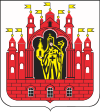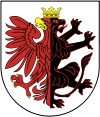Grudziądz
| Grudziądz | |||
|---|---|---|---|
 |
|||
|
|||
| Motto: Grudziądz - miasto na szczęście (Grudziądz - city of good luck) |
|||
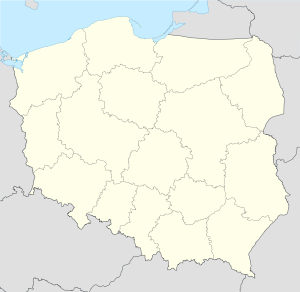 Grudziądz
|
|||
| Coordinates: | |||
| Country | |||
| Voivodeship | Kuyavian-Pomeranian | ||
| County | city county | ||
| Established | 11th century | ||
| Town rights | 1291 | ||
| Government | |||
| - Mayor | Robert Malinowski | ||
| Area | |||
| - Total | 57.76 km2 (22.3 sq mi) | ||
| Elevation | 50 m (164 ft) | ||
| Population (2010[1]) | |||
| - Total | 96,042 | ||
| - Density | 1,662.8/km2 (4,306.6/sq mi) | ||
| Time zone | CET (UTC+1) | ||
| - Summer (DST) | CEST (UTC+2) | ||
| Postal code | 86-300 to 86-311 | ||
| Area code(s) | +48 056 | ||
| Car plates | CG | ||
| Website | http://www.grudziadz.pl | ||
Grudziądz [ˈɡrud͡ʑɔnt͡s] (![]() listen) (German: Graudenz, Latin: Graudensis) is a city in northern Poland on the Vistula River, with 96 042 inhabitants (2010). Situated in the Kuyavian-Pomeranian Voivodeship (since 1999), the city was previously in the Toruń Voivodeship (1975–1998).
listen) (German: Graudenz, Latin: Graudensis) is a city in northern Poland on the Vistula River, with 96 042 inhabitants (2010). Situated in the Kuyavian-Pomeranian Voivodeship (since 1999), the city was previously in the Toruń Voivodeship (1975–1998).
Contents |
History

In 1291, the town received German Kulm law city rights from the monastic state of the Teutonic Knights. In 1440, the town joined the Prussian Confederation, and between 1466 and 1772, the city belonged to Polish province of Royal Prussia. Following the First Partition of Poland in 1772, the city (then called Graudenz) was annexed by the King Frederick II of Prussia and made part of the German Kingdom of Prussia. In 1871, during the unification of Germany, it became part of the Prussian-led German Empire. A light cruiser of the German Imperial Navy, built in 1912-1914, was named after the city.
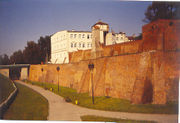
After the construction of a railroad bridge across the Vistula in 1878, Graudenz became a rapidly growing industrialized city as well as a district centre in 1900. In the 1912 Reichstag elections, 21% of the votes were given to Polish candidates, while the National Liberal Party of Germany received 53% of all votes. On January 23, 1920, in accordance with the Treaty of Versailles, Grudziądz became part of the newly created Polish republic. At the time, 84% of the population of the town and 58% of the county were German.
In the 20 years between the world wars, Grudziądz served as an important centre of culture and education with one of the biggest Polish military garrisons and several military schools located both within the confines of the city and around it. A large economic potential, and the existence of important institutions like the Pomeranian Tax Office and the Pomeranian Chamber of Industry and Trade, helped Grudziądz become the economic capital of the Pomeranian Voivodeship in the interwar period. Grudziądz's economic potential was featured at the First Pomeranian Exhibition of Agriculture and Industry in 1925, officially opened by Stanisław Wojciechowski, the President of the Second Polish Republic.
The 64th and 65th Infantry Regiments and the 16th Light Artillery Regiment of the Polish Army were stationed in Grudziądz during the 19 years of interwar period. They were part of the 16th Infantry Division, which had its headquarters in the city, as did the cavalry's famous 18th Pomeranian Uhlans Regiment. The Grudziądz Centre of Cavalry Training educated many notable army commanders. Military education in Grudziądz was also provided by the Centre of the Gendarmerie, the Air School of Shooting and Bombarding, and the N.C.O. Professional School, which offered courses for infantry reserve officer cadets.
Historical population
of Grudziądz
| 1880 | 17,321 | |
| 1905 | 35,958 | |
| 1980 | 90,000 | |
| 1990 | 102,300 | |
| 1995 | 102,900 | |
| 1999 | 102,434 | |
| 2000 | 100,787 | |
| 2006 | 99 578 | |
| 2007 | 99 090 | |
| 2010 | 96 042 |
On September 3, 1939 military troops of Nazi Germany entered Grudziądz and, as Graudenz, annexed the city into the Reichsgau Danzig-West Prussia, starting a five-year long occupation lasting till the end of World War II. Graudenz was the location of the German concentration camp Graudenz, a subcamp of the Stutthof concentration camp. As the result of heavy fighting in 1945, over 60% of the city was destroyed. Soviet Major Lev Kopelev is reporting those battles and the final surrender of the German garrison in his book "To Be Preserved Forever". At war's end, the German-speaking population of the city left or was expelled and replaced with Poles from Polish areas annexed by the Soviet Union.
Notable residents
- Petrus Wilhelmi de Grudencz, Polish: Piotr z Grudziądza (ca. 1400-ca. 1480), composer
- Alfred Wohl (1863–1946), German chemist
- Max Winkler (1875–1961) was Mayor of Graudenz
- Ernst Hardt (1876–1947), writer
- Waldemar Kophamel (1880–1934), U-Boat commander
- Leo White (1882–1948), stage performer
- Bolesław Orliński (1899–1992), Polish aviator and test pilot
- Kurt Weyher (1901–1991), Admiral
- Antoni Czortek (1915–2003), boxing champion
- Henryk Sawistowski (1925–1984), dean of City and Guilds College of London Institute
- Waldemar Baszanowski (born 1935), Olympic champion weightlifter
- Stefania Toczyska (born 1943), mezzo-soprano singer
- Bronisław Malinowski (1951–1981), Olympic Champion in the 3000m steeplechase race, 1980 Summer Olympics
- Krzysztof Buczkowski (born 1986), motorcycle speedway rider
Education
- Nicolaus Copernicus University
- Grudziądzka Szkoła Wyższa
International relations
Twin towns — Sister cities
Gallery
 Night-time landscape |
 Former Jesuit college, today City Council |
 Spichrzowa Street |
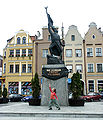 Memorial to a Polish soldier in the main square |
|
St. Mary's Church |
 Church of St. Francis Xavier |
 St. Mikołaj (Nicholas) church |
 Miejski Park |
Notes
External links
 Media related to Grudziądz at Wikimedia Commons
Media related to Grudziądz at Wikimedia Commons- Municipal website
- History website
- Unofficial website of the city - registered press Faktygrudziadz.pl
|
||||||||||
|
||||||||||||||

